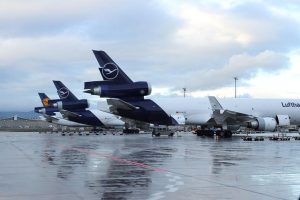
Wide-body airplanes are commonly used in the commercial airline industry. All of the top commercial airlines have wide-body airplanes in their respective fleets. Even if you aren’t familiar with them, you’ve probably seen a wide-body airplane before. What are wide-body airplanes exactly, and how do they differ from other types of airplanes?
What Is a Wide-Body Airplane?
A wide-body airplane is a type of commercial airplane with two aisles of seats. Also known as twin-aisle airplanes, they are characterized by a wide fuselage. The fuselage, of course, is the body of an airplane that contains the seats. Wide-body airplanes have a wide fuselage that can accommodate two side-by-side aisles of seats.
While there are different types of wide-body airplanes, most of them measure about 16 to 20 feet in diameter. The diameter represents the width of the fuselage. Most wide-body airplanes have a fuselage that measures 16 to 20 feet wide. This size allows them to accommodate two aisles of seats.
How Wide-Body Airplanes Differ From Other Types of Airplanes
In addition to wide-body airplanes, there are narrow-body airplanes. Narrow-body airplanes have a smaller fuselage than their wide-body counterparts. While wide-body airplanes can accommodate two aisles of seats, narrow-body airplanes can only accommodate a single aisle of seats.
Most narrow-body airplanes measure about 8 to 13 feet in diameter. As a result, they are smaller than wide-body airplanes. They have a smaller fuselage that can only accommodate a single aisle of seats.
Common Features of Wide-Body Airplanes
All wide-body airplanes can accommodate two aisles of seats. But there are other features that distinguish them from narrow-body airplanes.
Passengers typically have more space in wide-body airplanes. They aren’t as cramped as narrow-body airplanes, so many passengers prefer them.
Loading and unloading is typically faster on wide-body airplanes. With their twin-aisle design, they support faster loading and unloading.
Jumbo Jet Wide-Body Airplanes Explained
Some wide-body airplanes are categorized as jumbo jets. The term “jumbo jet” is reserved for the largest wide-body airplanes. There are only a handful of true jumbo jets, all of which are larger than standard wide-body airplanes.
Examples of jumbo jets include the Boeing 747 — the 747 was the first jumbo jet — as well as the Airbus A370 and the Airbus A350-1000. All of these airplanes can accommodate two aisles of seats. With that said, they are larger than other wide-body airplanes, so they are given the “jumbo jet” label.



